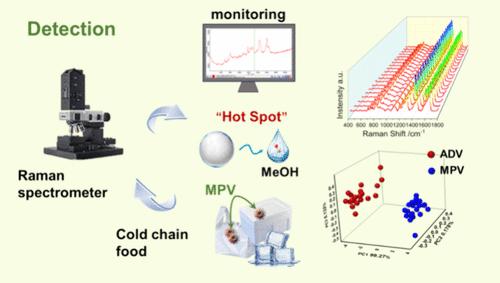Low-Temperature Substrate: Detection of Viruses on Cold Chain Food Packaging Based on Surface-Enhanced Raman Spectroscopy
IF 11.3
1区 化学
Q1 CHEMISTRY, PHYSICAL
引用次数: 0
Abstract
Viruses are mostly resistant to low temperatures and can survive for a long time and maintain their infectivity at temperatures below 0 °C. Therefore, realizing virus detection at low temperatures is a great challenge. Subzero temperatures change the state of the water-soluble substrate, increasing the difficulty of detection. In this work, we designed a novel enhancement substrate to obtain SERS signals of biomolecules stably at low temperatures. For the first time, methanol solvent was introduced into the aqueous system of silver nanoparticles modified with iodide ions. The introduction of methanol solvent not only serves as an anticoagulant to keep the system stable at low temperatures, but it can also improve nanoparticles and form a “hot spot”, which is more suitable for virus detection. This low-toxicity, rapid, and highly sensitive in situ detection technique lays the foundation for the development of SERS technology in the field of food and life sciences.

低温基底:基于表面增强拉曼光谱检测冷链食品包装上的病毒
病毒大多对低温有抵抗力,在 0 °C 以下的温度下可以存活很长时间并保持感染力。因此,在低温条件下实现病毒检测是一项巨大的挑战。零下温度会改变水溶性底物的状态,增加检测难度。在这项工作中,我们设计了一种新型的增强底物,可以在低温下稳定地获得生物分子的 SERS 信号。我们首次将甲醇溶剂引入碘离子修饰的银纳米粒子的水体系中。甲醇溶剂的引入不仅能起到抗凝剂的作用,使体系在低温下保持稳定,还能改善纳米粒子,形成 "热点",更适合病毒检测。这种低毒、快速、高灵敏度的原位检测技术为 SERS 技术在食品和生命科学领域的发展奠定了基础。
本文章由计算机程序翻译,如有差异,请以英文原文为准。
求助全文
约1分钟内获得全文
求助全文
来源期刊

ACS Catalysis
CHEMISTRY, PHYSICAL-
CiteScore
20.80
自引率
6.20%
发文量
1253
审稿时长
1.5 months
期刊介绍:
ACS Catalysis is an esteemed journal that publishes original research in the fields of heterogeneous catalysis, molecular catalysis, and biocatalysis. It offers broad coverage across diverse areas such as life sciences, organometallics and synthesis, photochemistry and electrochemistry, drug discovery and synthesis, materials science, environmental protection, polymer discovery and synthesis, and energy and fuels.
The scope of the journal is to showcase innovative work in various aspects of catalysis. This includes new reactions and novel synthetic approaches utilizing known catalysts, the discovery or modification of new catalysts, elucidation of catalytic mechanisms through cutting-edge investigations, practical enhancements of existing processes, as well as conceptual advances in the field. Contributions to ACS Catalysis can encompass both experimental and theoretical research focused on catalytic molecules, macromolecules, and materials that exhibit catalytic turnover.
 求助内容:
求助内容: 应助结果提醒方式:
应助结果提醒方式:


